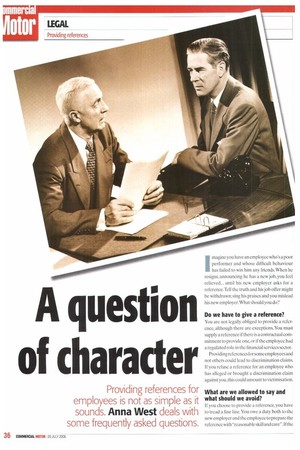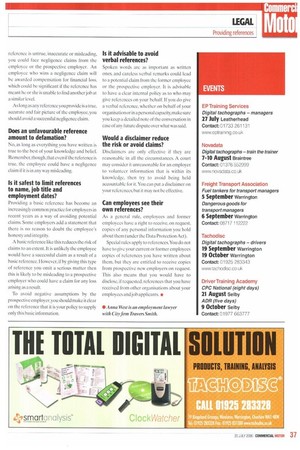A question of charader
Page 36

Page 37

If you've noticed an error in this article please click here to report it so we can fix it.
Providing references for employees is not as simple as it
sounds. Anna West deals with
some frequently asked questions.
Imagine you have an employee who's a poor performer and whose difficult behaviour has failed to win him any friends. When he resigns, announcing he has a new job, you feel relieved... until his new employer asks for a reference.Tell the truth and his job offer might be withdrawn; sing his praises and you mislead his new employer.What should you do?
Do we have to give a reference?
You are not legally obliged to provide a reference, although there are exceptions. You must supply a reference if there is a contractual commitment to provide one, or if the employee had a regulated role in the financial services sector.
Providing references forsome employees and not others could lead to discrimination claims. If you refuse a reference for an employee who has alleged or brought a discrimination claim against you, this could amount to victimisation.
What are we allowed to say and what should we avoid?
If you choose to provide a reference, you have to tread a fine line. You owe a duty both to the new employer and the employee to prepare the reference with "reasonable skill and care". If the reference is untrue, inaccurate or misleading, you could face negligence claims from the employee or the prospective employer. An employee who wins a negligence claim will be awarded compensation for financial loss, which could be significant if the reference has meant he or she is unable to find another job at a similar level.
As long as any reference you provide is a true. accurate and fair picture of the employee, you should avoid a successful negligence claim.
Does an unfavourable reference amount to defamation?
No, as long as everything you have written is true to the best of your knowledge and belief. Remember,though, that even if the reference is true, the employee could have a negligence claim if it is in any way misleading.
Is it safest to limit references to name, job title and employment dates?
Providing a basic reference has become an increasingly common practice for employers in recent years as a way of avoiding potential claims. Some employers add a statement that there is no reason to doubt the employee's honesty and integrity.
A basic reference like this reduces the risk of claims to an extent. It is unlikely the employee would have a successful claim as a result of a basic reference. However, if by giving this type of reference you omit a serious matter then this is likely to be misleading to a prospective employer who could have a claim for any loss arising as a result.
To avoid negative assumptions by the prospective employer, you should make it clear on the reference that it is your policy to supply only this basic information.
Is it advisable to avoid verbal references?
Spoken words are as important as written ones, and careless verbal remarks could lead to a potential claim from the former employee or the prospective employer. It is advisable to have a clear internal policy as to who may give references on your behalf. If you do give a verbal reference, whether on behalf of your organisation or in a personal capacity,make sure you keep a detailed note of the conversation in case of any future dispute over what was said.
Would a disclaimer reduce the risk or avoid claims?
Disclaimers are only effective if they are reasonable in all the circumstances. A court may consider it unreasonable for an employer to volunteer information that is within its knowledge, then try to avoid being held accountable for it. You can put a disclaimer on your references, but it may not be effective.
Can employees see their own references?
As a general rule, employees and former employees have a right to receive, on request, copies of any personal information you hold about them (under the Data Protection Act).
Special rules apply to references. You do not have to give your current or former employees copies of references you have written about them, but they are entitled to receive copies from prospective new employers on request. This also means that you would have to disclose, if requested, references that you have received from other organisations about your employees and job applicants. • • Anna West is an employment lawyer with City firm Travers Smith.
























































































































































































